AWM41 973 - [Nurses Narratives] Sister L E Fletcher - Part 2
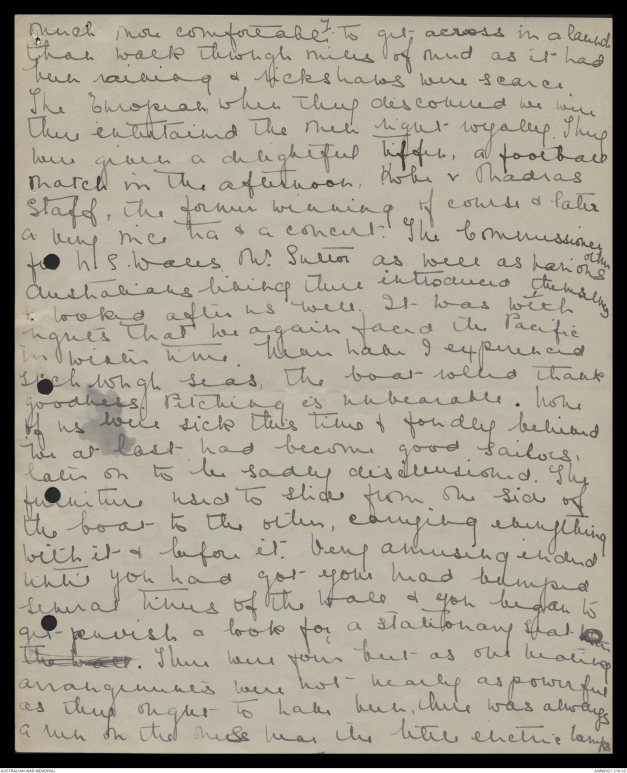
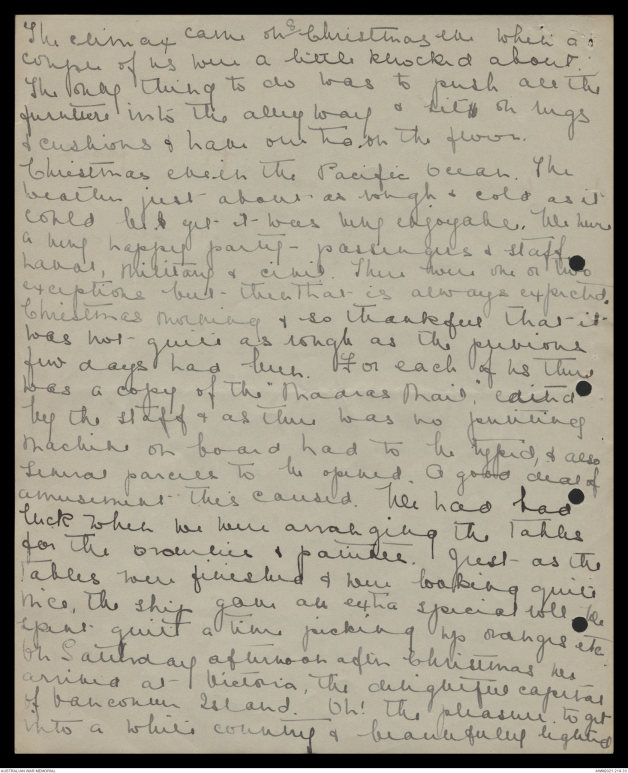
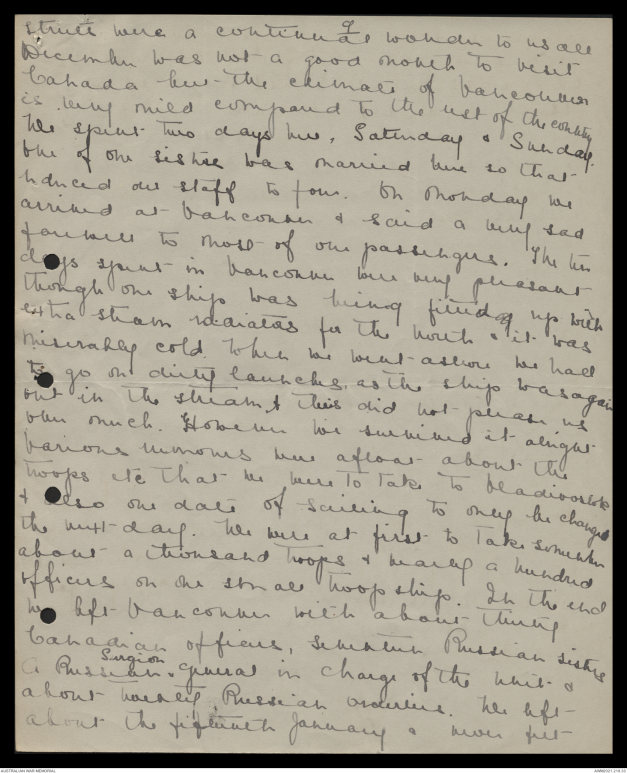
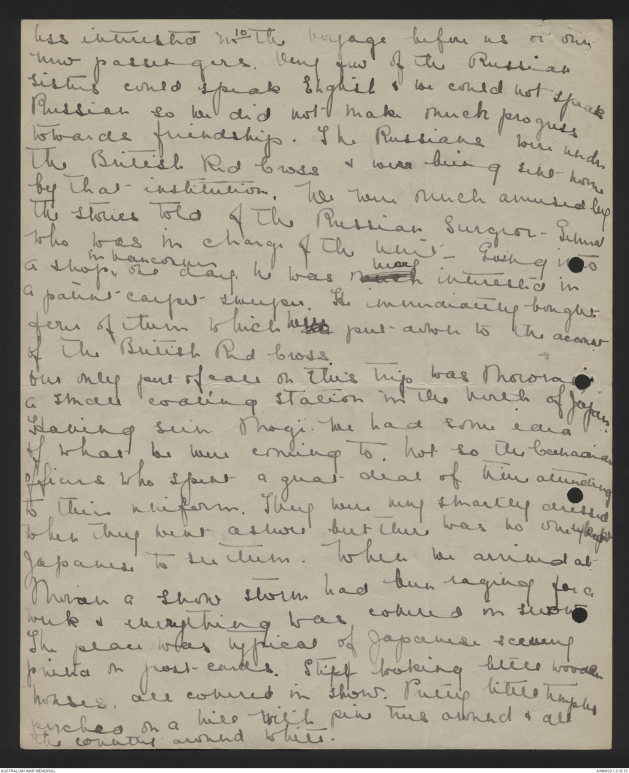
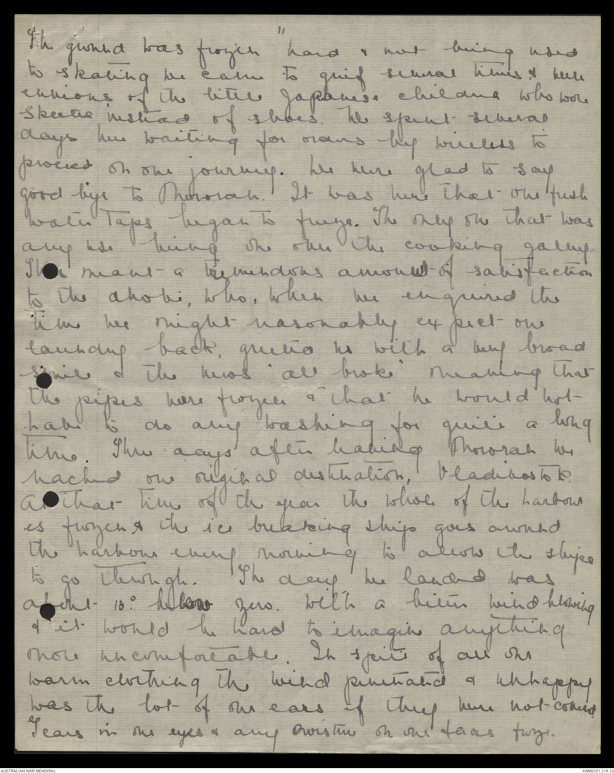
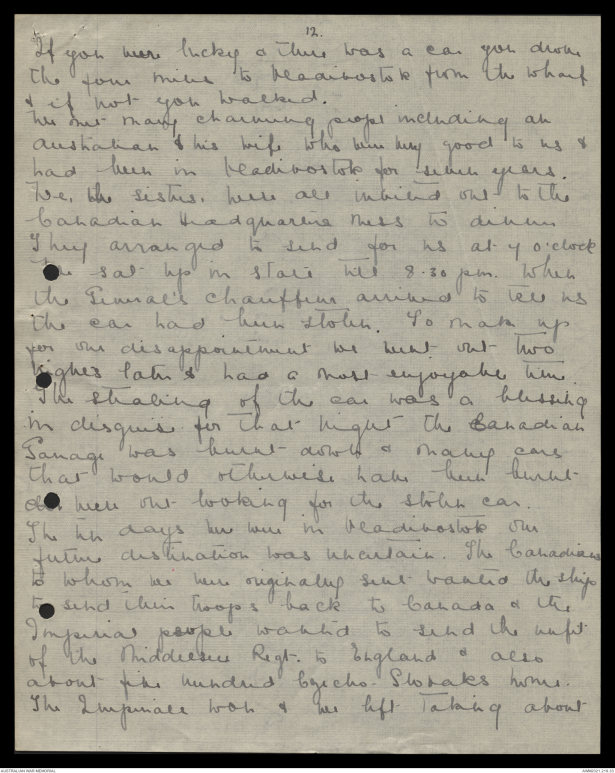
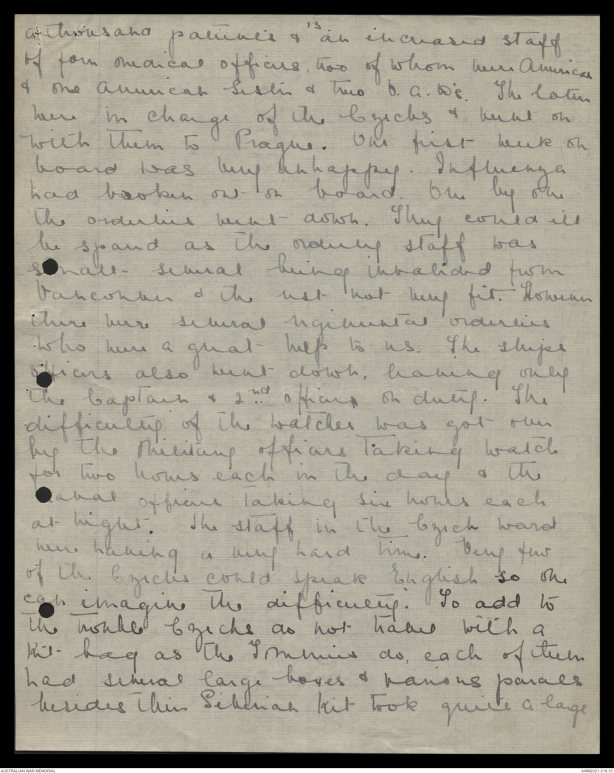
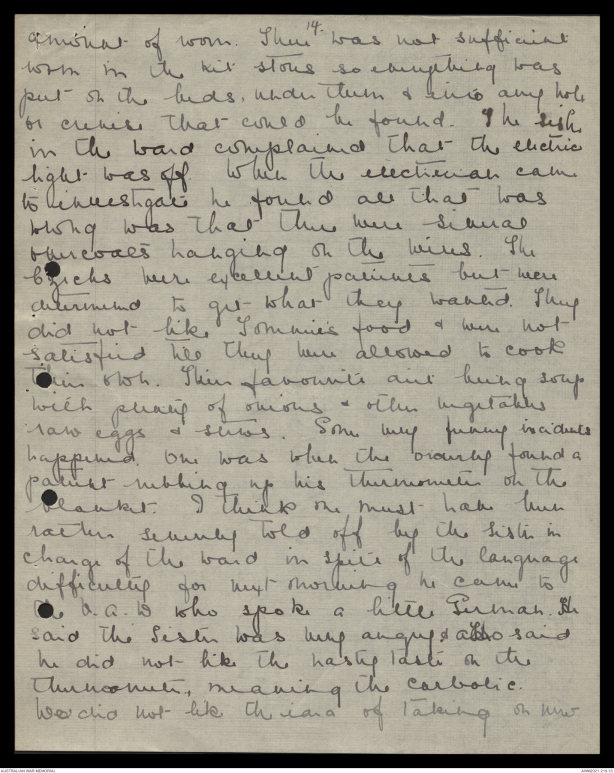
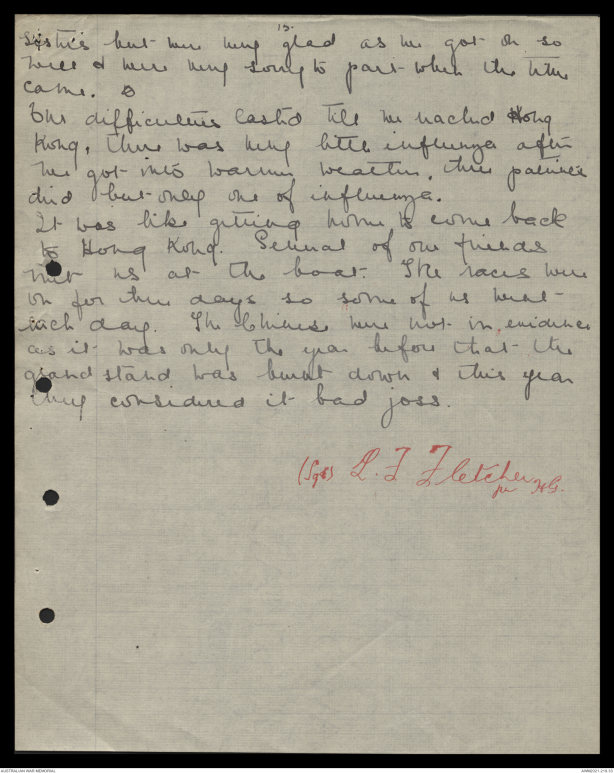
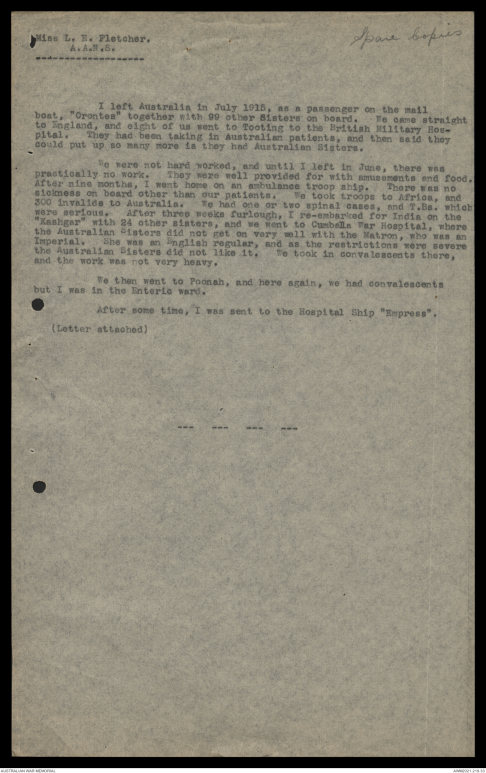
7
Much more comfortable to get across in a launch
than walk through miles of mud as it had
been raining & rickshaws were scarce.
The European when they discovered we were
there entertained the men right royally. They
were given a delightful tiffin, a football
match in the afternoon. Kobe v Madras
Staff, the former winning of course & later
a very nice tea & a concert. The Commissioner
for N.S. Wales, Mr. Suttor as well as various other
Australians living there introduced themselves
& looked after us well. It was with
regrets that we again faced the Pacific
in winter time. Never have I experienced
such high seas, the boat rolled thank
goodness. Pitching is unbearable. None
of us were sick this time & fondly believed
we at last had become good sailors,
later on to be sadly disillusioned. The
furniture used to slide from one side of
the boat to the other, carrying everything
with it & before it. Very amusing indeed
until you had got your head bumped
several times of the wall & you began to
get peevish & look for a stationary seat xxxxthe wall. There were four but as one making
arrangements were not nearly as powerful
as they ought to have been, there was always
a run on the ones near the little electric lamps
8
The climax came on Christmas eve when a
couple of us were a little knocked about.
The only thing to do was to push all the
furniture into the alley way & sits on rugs
& cushions & have our tea on the floor.
Christmas eve in the Pacific Ocean. The
weather just about as rough & cold as it
could be & yet it was very enjoyable. We were
a very happy party - passengers & staff
Naval, Military & civil. There were one or two
exceptions but then that is always expected.
Christmas morning & so thankful that it
was not quite as rough as the previous
few days had been. For each of us there
was a copy of the "Madras Mail" edited
by the staff & as there was no printing
machine on board had to be typed, & also
several parcels to be opened. A good deal of
amusement this caused. We had had
luck when we were arranging the tables
for the orderlies & patients. Just as the
tables were finished & were looking quite
nice, the ship gave an extra special roll. We
spent quite a time picking up oranges etc.
On Saturday afternoon after Christmas we
arrived at Victoria, the delightful capital
of Vancouver Island. Oh! the pleasure to get
into a white country & beautifully lighted
9
streets were a continual wonder to us all
December was not a good month to visit
Canada but the climate of Vancouver
is very mild compared to the rest of the country
We spent two days here, Saturday & Sunday.
One of our sisters was married here so that
reduced our staff to four. On Monday we
arrived at Vancouver & said a very sad
farewell to most of our passengers. The two
days spent in Vancouver were very pleasant
though one ship was being fitted x up with
extra steam radiators for the north & it was
miserably cold. When we went ashore we had
to go on dirty launches, as the ship was again
out in the stream & this did not please us
over much. However we survived it alright
Various rumours were afloat about the
troops etc that we were to take to Vladivostok
& also one date of sailing to only be changed
the next day. We were at first to take somewhere
about a thousand troops & nearly a hundred
officers on one small troop ship. In the end
we left Vancouver with about thirty
Canadian officers, seventeen Russian sisters
a Russian ^Surgion - General in charge of the unit &
about twenty Russian orderlies. We left
about the fifteenth January & never felt
10
less interested in the voyage before us or our
new passengers. Very few of the Russian
sisters could speak English & we could not speak
Russian so we did not make much progress
towards friendship. The Russians were under
the British Red Cross & were being sent home
by that institution. We were much amused by
the stories told of the Russian Surgeon - General
who was in charge of the unit - Going into
a shop ^in Vancouver one day, he was much very interested in
a patent carpet sweeper. He immediately bought
four of them which he were put debit to the account
of the British Red Cross.
Our only port of call on this trip was Mororan
a small coaling station in the North of Japan.
Having seen Mogi we had some idea
of what we were coming to. Not so the Canadian
Officers who spent a great deal of theirs attending
to their uniform. They were very smartly dressed
when they went ashore but there was no one except
Japanese to see them. When we arrived at
Mororan a short storm had been raging for a
week & everything was covered in snow
The place was typical of Japanese scenery
painted on post-cards. Stiff looking little wooden
houses all covered in snow. Pretty little temples
perched on a hill with pine trees around & all
the country around white.
11
The ground was frozen hard & not being used
to skating we came to grief several times & were
envious of the little Japanese children who wore
skates instead of shoes. We spent several
days here waiting for orders by wireless to
proceed on our journey. We were glad to say
good bye to Mororan. It was here that our fresh
water taps began to freeze. The only one that was
any use being one over the cooking galley.
This meant a tremendous amount of satisfaction
to the dhobi, who, when we enquired the
time we might reasonably expect our
laundry back, greeted us with a very broad
smile & the news "all broke" meaning that
the pipes were frozen & that he would not
have to do any washing for quite a long
time. Three days after leaving Mororan we
reached our original destination, Vladivostok.
At that time of the year the whole of the harbour
is frozen & the ice breaking ship goes around
the harbour every morning to allow the ships
to go through. The day we landed was
about 13o below zero with a bitter wind blowing
& it would be hard to imagine anything
more uncomfortable. In spite of all our
warm clothing the wind penetrated & unhappy
was the lot of our ears if they were not covered
Tears in our eyes & any moisture on our faces froze.
12.
If you were lucky & there was a car you drove
the four miles to Vladivostok from the wharf
& if not you walked.
We met many charming people including an
Australian & his wife who were very good to us &
had been in Vladivostok for seven years.
We, the sisters, were all invited out to the
Canadian Headquarters Mess to dinner
They arranged to send for us at 7 o'clock
We sat up in state until 8.30 pm. When
the General's chauffer arrived to tell us
the car had been stolen. To make up
for our disappointment we went out two
nights later & had a most enjoyable time.
The stealing of the car was a blessing
in disguise for that night the Canadian
Garage was burnt down & many cars
that would otherwise have been burnt
also were out looking for the stolen car.
The ten days we were in Vladivostok our
future destination was uncertain. The Canadians
to whom we were originally sent wanted the ship
to send their troops back to Canada & the
Imperial people wanted to send the unfit
of the Middlesex Regt. to England & also
about five hundred Czecho-Slovaks home.
The Imperial won & we left taking about
13.
a thousand patients & an increased staff
of four medical officers, two of whom were American
& one American Sister & two V.A.W's The later
here in charge of the Czechs & went on
with them to Prague . The first week on
board was very unhappy. Influenza
had broken out on board. One by one
the orderlies went down. They could ill
be spared as the orderly staff was
small - several being invalided from
Vancouver & the rest not very fit. However
there were several regimental orderlies
who were a great help to us. The ships
officers also went down, leaving only
the Captain & 2nd officers on duty. The
difficulty of the watches was got over
by the Military officers taking watch
for two hours each in the day & the
naval officers taking six hours each
at night. The staff in the Czech ward
were having a very hard time. Very few
of the Czechs could speak English so one
can imagine the difficulty. To add to
the trouble Czechs as not travel with a
kit bag as the Tommies do, each of them
had several large boxes & various parcels
besides their Siberian kit took quite a large
14.
amount of room. There was not sufficient
room in the kit stores so everything was
put on the beds, under them & into any hole
or crevise that could be found. The Sisters
in the ward complained that the electric
light was off. When the electrician came
to investigate he found all that was
wrong was that there were several
overcoats hanging on the wires. The
Czechs were excellent patients but were
determined to get what they wanted. They
did not like Tommies food & were not
satisfied till they were allowed to cook
their own. Their favourite diet being soup
with plenty of onions & other vegetables
raw eggs & stews. Some very funny incidents
happened. One was when the orderly found a
patient rubbing up his thermometer on the
blanket. I think he must have been
rather severely told off by the Sister in
Charge of the ward in spite of the language
difficulty for next morning he came to
the V.A.W who spoke a little German. He
said the Sister was very angry & also said
he did not like the nasty taste on the
thermomenter, meaning the carbolic.
We did not like the idea of taking on new
15
Sisters but were very glad as we got on so
well & were very sorry to part when the time
came. O
Our difficulties lasted till we reached Hong
Kong, there was very little influenza after
we got into warmer weather, three patients
died but only one of influenza.
It was like getting home to come back
to Hong Kong. Several of our friends
met us at the boat. The races were
on for three days so some of us went
each day. The Chinese were not in evidence
as it was only the year before that the
grand stand was burnt down & this year
they considered it bad joss.
(Sgd) L.F. Fletcher
per HG.
Spare Copies
Miss L.E. Fletcher.
A.A.N.S.
I left Australia in July 1915, as a passenger on the mail
boat, "Orontes" together with 99 other Sisters on board. We came straight
to England, and eight of us went to Tooting to the British Military Hospital.
They had been taking in Australian patients, and then said they
could put up so many is they had Australian Sisters.
We were not hard worked, and until I left in June, there was
practically no work. They were well provided for with amusements and food.
After nine months, I went home on an ambulance troop ship. There was no
sickness on board other than our patients. We took troops to Africa, and
300 invalids to Australia. We had one or two spinal cases, and T.Bs. which
were serious. After three weeks furlough, I re-embarked for India on the
"Kashgar" with 24 other sisters, and we went to Cumbella War Hospital, where
the Australian Sisters did not get on very well with the Matron, who was an
Imperial. She was an English regular, and as the restrictions were severe
the Australian Sisters did not like it. We took in convalescents there,
and the work was not very heavy.
We then went to Poonah, and here again, we had convalescents
but I was in the Enteric ward.
After some time, I was sent to the Hospital Ship "Empress".
(Letter attached)
 Sam scott
Sam scottThis transcription item is now locked to you for editing. To release the lock either Save your changes or Cancel.
This lock will be automatically released after 60 minutes of inactivity.